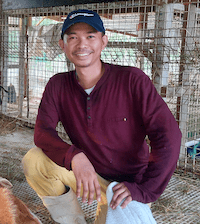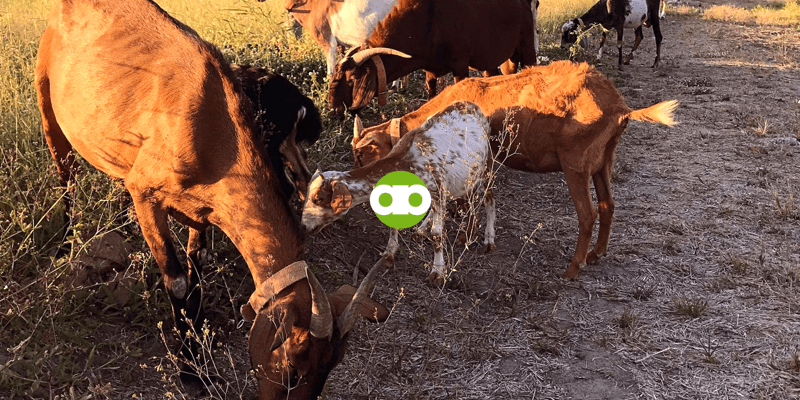Goat farming holds significant potential for sustainable livelihoods and agricultural development in the Philippines. With its adaptability to diverse environmental conditions, efficient feed conversion rates, and multiple products including meat, milk, and fibers, goat farming presents a lucrative opportunity for farmers. However, success in this endeavor requires thorough knowledge, careful planning, and meticulous management. This article aims to shed light on 10 common mistakes encountered by goat farmers in the Philippines from a scientific standpoint, offering insights and recommendations to enhance productivity and profitability.
Mistake # 1: Neglecting Proper Breeding Practices
One prevalent mistake among goat farmers is the neglect of proper breeding practices. Failure to select suitable breeding stock based on desired traits such as high milk yield, fast growth rate, and disease resistance can hinder genetic improvement and productivity. Adopting scientific methods such as controlled mating, artificial insemination, and genetic selection can enhance the overall quality of the herd. In our goat farming seminar at the Alpha Agventure Farms, we highly discourage inbreeding among animals.
Mistake # 2: Inadequate Nutrition Management
Nutrition plays a pivotal role in goat health, reproduction, and productivity. Insufficient access to quality forage, improper feed formulations, and deficiencies in essential nutrients can lead to stunted growth, low fertility rates, and susceptibility to diseases. Farmers should consult with veterinary nutritionists to formulate balanced diets tailored to the specific requirements of their goats, considering factors such as age, weight, and physiological status. If you are looking for a reliable supplier of fermented corn silage the whole year round, Alpha Agventure Farms is ready to sign a contract with you.
Mistake # 3: Poor Housing and Hygiene Practices
Inadequate housing facilities and poor hygiene practices pose significant challenges in goat farming. Overcrowding, improper ventilation, and inadequate sanitation can increase the risk of infectious diseases such as pneumonia, mastitis, and foot rot. Implementing proper housing designs, regular cleaning routines, and biosecurity measures can mitigate disease transmission and promote optimal health conditions within the herd. Sign up to this online goat farming seminar to learn Alpha Agventure Farms’ Housing and Biosecurity Programs.
Mistake # 4: Lack of Disease Prevention and Control Measures
Diseases pose a constant threat to goat farming operations, causing substantial economic losses and jeopardizing animal welfare. Neglecting vitamin schedules, inadequate parasite control, and failure to quarantine new animals can escalate disease outbreaks. Farmers should develop comprehensive disease prevention and control protocols in collaboration with veterinarians, including strategic deworming and biosecurity measures to safeguard the health of their goats. You can hire Mr. Jaycee de Guzman, founder of Alpha Agventure Farms, as your farm consultant.
Mistake # 5: Ignoring Reproductive Management
Efficient reproductive management is essential for maximizing breeding efficiency and ensuring a steady supply of offspring for meat or dairy production. Neglecting estrus detection, improper mating practices, and inadequate prenatal care can result in reproductive inefficiencies and reduced profitability. Employing reproductive technologies such as estrus synchronization, pregnancy diagnosis, and assisted reproductive techniques can optimize breeding outcomes and enhance overall herd productivity. If you’re looking for a reliable source of hybrid goats, Anglo-Nubians, and Boers, you can buy some from Alpha Agventure Farms.
Mistake # 6: Failure to Implement Record-Keeping
Effective record-keeping is indispensable for monitoring herd performance, tracking breeding histories, and making informed management decisions. Neglecting to maintain accurate records of births, deaths, vaccinations, and production parameters can impede farm management and hinder performance evaluation. Utilizing digital or manual record-keeping systems can facilitate data management and analysis, enabling farmers to identify trends, diagnose issues, and optimize management practices. Many Filipino farmers are guilty on this.
Mistake # 7: Overlooking Marketing Strategies
Successful goat farming extends beyond production to encompass effective marketing strategies for product commercialization and market access. Neglecting market research, inconsistent product quality, and lack of branding can limit market penetration and profitability. Farmers should identify target markets, establish value-added products, and develop marketing channels through partnerships with local cooperatives, retailers, and processors to capitalize on market opportunities and maximize returns. Many, if not all, smallholder goat raisers in the Philippines tend to prioritize posting and asking about goat selling prices on Facebook groups, rather than calculating their own selling prices based on expenses and desired profit margins.
Mistake # 8: Underestimating the Importance of Training and Education
Continuous learning and skills development are integral components of successful goat farming enterprises. Underestimating the need for training in animal husbandry practices, business management, and market dynamics can hinder farm efficiency and competitiveness. Farmers should actively seek training programs, workshops, and extension services provided by agricultural agencies, universities, and industry associations to acquire knowledge, enhance skills, and stay abreast of industry trends.
There are free and premium ways to learn goat farming in a science-based, experience-driven, and technology-oriented manner. The free way is by reading all the articles and watching the videos on the BLOG page of Alpha Agventure Farms’ website. The premium method, which is a more organized approach to learning, is by registering to the online goat farming seminar of Alpha Agventure Farms. You’ll learn the cultural management and marketing of goats.
Mistake # 9: Disregarding Environmental Sustainability
Goat farming practices can exert significant environmental impacts, including soil erosion, deforestation, and water pollution if not managed sustainably. Disregarding sustainable land management practices, overgrazing, and improper waste disposal can degrade natural resources and compromise long-term farm viability. Implementing agroecological principles, rotational grazing systems, and waste recycling techniques can minimize environmental footprint and promote ecological resilience on goat farms.
Mistake # 10: Failing to Plan for Succession and Risk Management
Planning for succession and risk management is crucial for the continuity and resilience of goat farming operations, especially in family-owned enterprises. Neglecting to establish succession plans, secure insurance coverage, and diversify income streams can jeopardize the farm’s future viability and sustainability. Farmers should engage in proactive succession planning, risk assessment, and financial management strategies to mitigate potential risks, ensure smooth transitions, and safeguard the legacy of their farming endeavors. Hiring Mr. Jaycee de Guzman, founder of Alpha Agventure Farms, as your farm consultant can help you on succession and risk management plan.
Goat farming holds immense potential for contributing to food security, rural development, and economic prosperity in the Philippines. However, realizing this potential requires concerted efforts to address common mistakes and implement evidence-based management practices. By adopting a scientific approach, embracing innovation, and prioritizing continuous learning, goat farmers can overcome challenges, enhance productivity, and achieve sustainable success in the dynamic agricultural landscape of the Philippines

Mr. Jaycee de Guzman is a self-taught agriculturist and the founder and patriarch of Alpha Agventure Farms, recognized as the leading backyard farm in the Philippines. With a rich background in livestock farming dating back to the early 1990s, Mr. de Guzman combines his expertise in agriculture with over 20 years of experience in computer science, digital marketing, and finance. His diverse skill set and leadership have been instrumental in the success of Alpha Agventure Farms.


